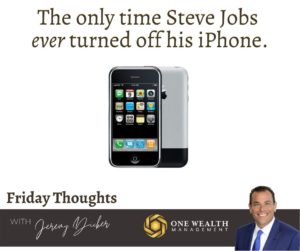
 I recently read an article about Steve Jobs and his iPhone use.
I recently read an article about Steve Jobs and his iPhone use.
Of course, as the iconoclastic head visionary at Apple, it’s no surprise that Jobs had his iPhone with him all the time.
According to first-hand accounts, he never shut it off. Ever…
Well, except for one and only one occasion in his workday (which, for Jobs, was every day).
Steve Jobs did hit the power button and turn off his iPhone whenever he met with his creative team at Apple.
For those minutes, hours, and days, Jobs wanted to discuss new ideas, product design, and vanguard innovations with absolutely no interruptions or distractions. That included keeping his trusty iPhone from ringing and beeping incessantly.
It used to drive his leadership team nuts. They wanted, no – needed to reach him and speak about important matters. How could he possibly turn off his phone and be inaccessible as the very fate of Apple depended on his every word?
But guess what?
The world didn’t end. Apple didn’t go into a freefall. And in fact, they got along just fine (that’s an understatement!).
It goes to show that what we WANT and what we NEED are two totally different things, especially when talking in the context of the technology that seemingly rules our lives.
It wasn’t always that way.
Do you remember when you used to get on a flight for an hour, two hours, or even twelve hours (where the heck were you going?!) with no Wi-Fi? Somehow, the world didn’t end.
In fact, you probably felt a lot better once you stepped off that flight after reading a book, taking a nap, or just having the headspace to slow down and reflect.
You may have even come up with a new idea, had the time and clarity to make an important decision, or gained a new perspective that helped you once Monday morning came around.
For instance, can you imagine what humanity would have missed if Steve Jobs did NOT turn off his phone? We would have lost out on the iPod, iPhones, Macs, Apple Watches, and much more.
But it’s not just products that Jobs and Apple changed forever, but the way we think about personal computing; our relationship with technology and how it can enrich and color our lives.
It’s amazing how much the simple process of turning off your phone (or email/social media/etc. – you get the point) has become a revolutionary act. It brings the power of thought, space to create, and the perspective to recalibrate where you are in life – and where you want to go.
For that reason, I recently started meditating. Yes, me meditating! I know, I know – how could I possibly sit still for that long and not be connected?
But, after doing it for only a few weeks, I discovered that the better question is, how could I not?
I encourage you, too, to carve out time to relax, reevaluate, and calm your mind. Consciously turn off and step away every once in a while.
The results will be simply incredible.
You may even start to, as Steve Jobs aptly put it, “Think differently.”
It sure worked for him!
